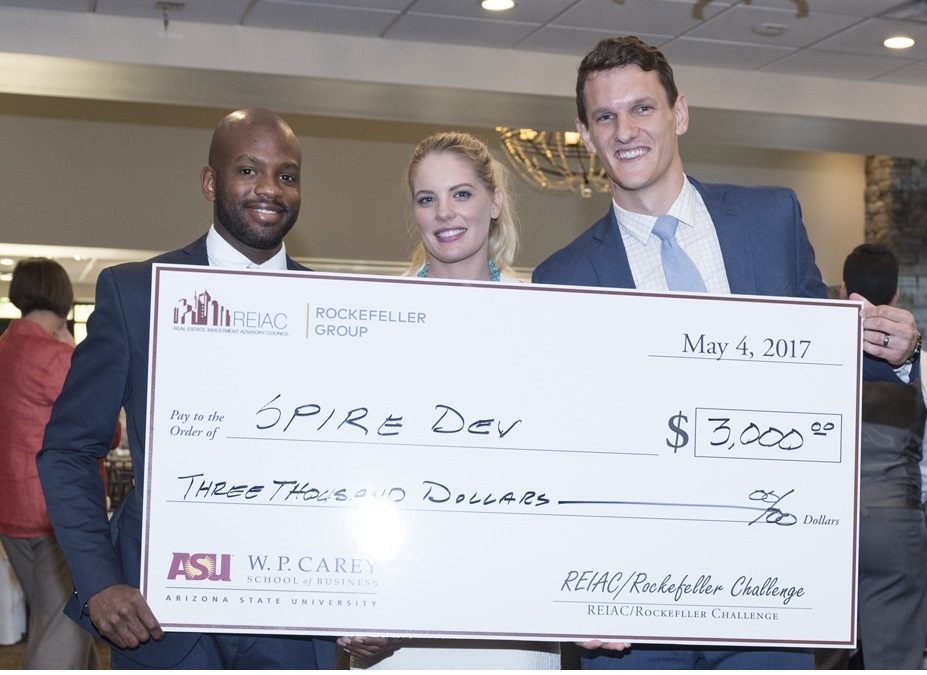4 teams compete in finals of annual W. P. Carey School of Business student event
PHOENIX, Ariz. (May 8, 2017) – The stakes were high – and the projects were well presented – as four teams competed in the 4th Annual MRED-REIAC/Rockefeller Group Challenge held recently at a Valley country club.
The teams consisting of graduating students from Arizona State University’s W. P. Carey School of Business, Masters of Real Estate Development (MRED) program competed for cash prizes. Spire Development captured the honor, garnering $1,000 each for members Anna Sepic, Jay Van Tussell, and Kyle Trent.
This year’s project consisted of a mixed-use development at Dorsey Lane and Apache Boulevard in Tempe. It featured six separate parcels including a new school for the arts; a retail center at the NWC of Dorsey and Apache; retail/office space at the NEC corner of Dorsey and Apache; and three parcels of vacant City of Tempe land.
Spire Development’s winning project, Third Space, was a four-phased master plan that included multifamily space of 70 apartments, 50 flats, 43 lofts, 16 studios, and 13 townhomes; a new school for the arts; a restaurant; a gym; and retail, office, and community space.
“Spire was exceptionally proud of the win,” Sepic said. “Our approach, after discussion with our financial mentor, Joe Blackbourn of Everest Holdings, was to go the realistic approach: what is most feasible? The best take away from Joe’s mentorship over the past two months is that real estate is not just about thinking of grand designs; it is understanding that a piece of property will ‘tell’ you what it should be.”
Sepic said the biggest challenge the team faced was making the financials work.
“We were flabbergasted,” she said. “The research showed a significantly depressed immediate demographic, high vacancy, as well as issues of crime and transients in the immediate area. Originally, we went with the bare minimum – what was feasible on the site with existing conditions. We met with various individuals including Mike and Casey Treadwell, Josh Simon, Pete TeKamp, Eric Brown, Ben Hall, Shelby Tworek, as well as our instructors from the MRED program. All gave us their expertise and pushed us to be as realistic as possible. Our biggest support was Joe (Blackbourn).”
The greatest satisfaction of participating in the MRED-REIAC/Rockefeller Group Challenge?
“Having various real estate experts through all the various industries who believed in the proposal and found our financial metrics and overall concept as viable,” Sepic said. “We came a long way as a team and even more so through our own new learned skills as a result of this competition.”
The other finalists and their projects:
- Crescendo Development – The Beat on Dorsey, a project to attract tech-savvy millennials in a transit-oriented walkable environment with public art installations and 7,000 square feet of open pavilion space.
- Collage Development – Collage at Dorsey Station, a project that’s the “character and soul of a community; a project that inspires us,” according to the presenters. It features dining, retail, office, a school for the arts, and artist loft space.
- CED Development – Joule: An Innovation District. This master-plan design is intended to “build off the momentum of the light rail and Tempe streetcar.” It is designed for those in the trade classes, engineering, and software design. It features creative space, maker space, co-working space, row houses, condos, and contemporary restaurants.
Each team was allotted 10 minutes to present a development solution followed by questions from the audience. Audience members chose the winning team immediately after the presentations.
“We really appreciate those in the industry, the mentors, and all the people who support the challenge,” said Mark Stapp, director of the MRED program. “This activity is as close as we can get to the actual business of making the pitch and getting the money.”
In addition to sponsoring the annual Challenge, REIAC awards two $2,500 scholarships to MRED students that have a financial need and want to pursue real estate careers in Arizona after they graduate.

